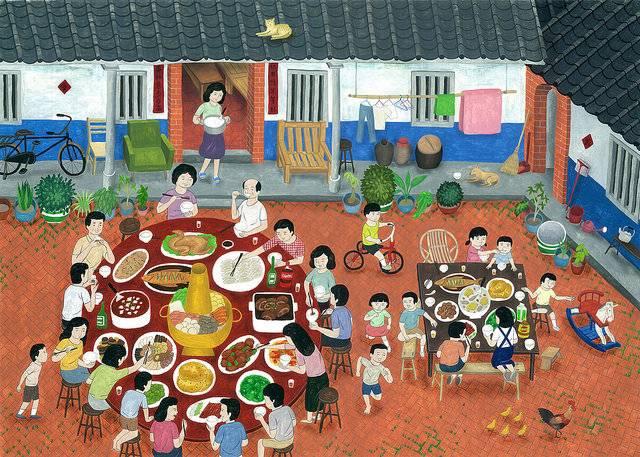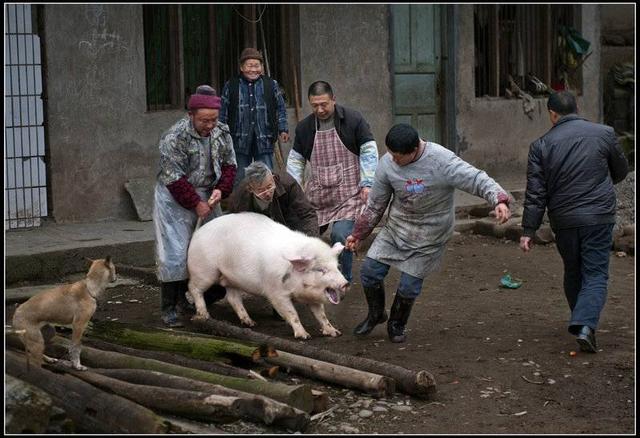Writer Li Chungang: Killing Year Pig Cooking Miscellaneous Vegetables; The Reunion Dinner in Xitougou, Erlang Mountain, Western Sichuan; Oral Folk Custom; My Spring Festival Memory.
Text | Li Chungang
Xitougou is a natural village under Erlang Mountain in Sijing Town, tianquan county, Ya ‘an City, Sichuan Province. For me, the year of Xitougou begins on the twentieth day of the twelfth lunar month.
At this time, those Xitougou people who have worked outside for a whole year are almost back, and I always have time to go back until the end of the year. Therefore, as soon as they return to Xitougou, they will call me one after another, or arrange for the younger generation, or even call me after receiving instructions from a handful of elders who are getting older and less and less every year to determine when I will go back, so that they can arrange the reunion dinner.

▲ Lianggen drawing
Because it is located between the mountains in western Sichuan, the reunion dinner in Xitougou is obviously different from other places. This difference is not only what we have called it since we were born, but also the content of the reunion dinner, which has always been the same: chicken, duck, fish and meat. Meat, especially pork, is essential for every family; Chicken, duck, and fish are three kinds, depending on their habits, tastes, and even economic conditions. For many years from small to large, almost every family in Xitougou only ate pork, and it seems that overnight, every family can have whatever they want on the dinner table of the family reunion dinner.
Pork is specific, but it can’t be shaken by thunder. After winter, the slaughtered pigs are smeared with salt and hung on the stove. After a few days of smoking, they become a dried pig’s head, a "sitting pier" with tail, intestines, tongue and belly-with a "head" and a "tail", plus viscera, which indicates completeness and perfection-before cooking the new year’s meal, they are removed from the stove and burned off the remaining hairs on the skin.

▲ Kill the Year Pig (photo by Jian Hong)
The most noteworthy thing is that it is cooked with pork into "miscellaneous vegetables". The so-called miscellaneous food actually includes four kinds: dried bamboo shoots, dried green beans, kelp and radish, so it is called miscellaneous food, which is about an ancestor who started from the long-term monotonous diet in Xitougou and then passed it on from mouth to mouth. Xitougou, located in the mountains, is rich in bamboo shoots. Every late spring and early summer, drying mats (mats made of bamboo sticks and specially used for drying grain and vegetables) are placed in the drying dam in front of almost every house. Those bamboo shoots collected from the mountains and left after three meals a day are cooked and spread in the drying mats, and after several fierce suns, they become dried bamboo shoots. The processing method of dried green beans is the same, except that green beans need to be planted by themselves, and the production season is later than bamboo shoots. Kelp, on the other hand, was bought back from the supermarket in the market years ago and washed after soaking in water in advance.
After the pork in the cauldron is cooked, take it out of the cauldron. After the dried bamboo shoots, dried green beans and kelp are almost cooked, put the big white radish pieces that have just been pulled up from the ground, and then open them for a while, and a cauldron full of "miscellaneous vegetables" will become. What is not eaten at the reunion dinner is served in a big bowl and becomes an essential dish for every meal. After eating "miscellaneous vegetables", it is almost "broken five". Strange to say, on other days, the "miscellaneous vegetables" cooked with the same materials and the same cooker and firewood could never taste the same as the reunion dinner.
This past New Year, I finally got back to Xitougou the day before New Year’s Eve. When I got back, it was like rushing to the scene. Every family had a family reunion dinner: my brother-in-law’s family, my family, my big cousin’s family, my adopted mother’s family, my seventh brother’s family, and Hua Ge’s family … until the abdominal distension was like a drum, and nothing could fit in their bellies. Even so, several of them failed to participate after being invited.
Name card:
Li Chungang, born in 1973, is the deputy chief physician of orthopedic surgery, a member of Chinese Writers Association, a member of the whole committee of Sichuan Writers Association and a member of the Prose Committee. His main works are essays, Crying for Pain, Migrating Water Flowing Through, Physical Illness and so on.

▲ Li Chungang
Reporting/feedback